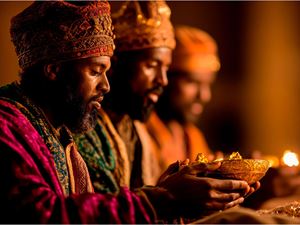
The Magi, or the Wise Men, are an essential part of the Christmas story as they represent the fulfillment of the ancient prophecies that a Messiah would be born for all nations, not just for the Jews. These wise men, often depicted as kings or scholars, came from the East, likely from areas like Persia or Babylon. Guided by a mysterious star, they traveled a great distance to find and honor the child born as “king of the Jews” (Matthew 2:2).
When they arrived in Bethlehem, they found the young Jesus with His mother, Mary. Bowing in worship, they presented Him with three gifts: gold, frankincense, and myrrh. These gifts were highly valuable and carried significant symbolic meaning. But what happened to these treasures? While the Bible doesn’t give us exact details, we can look at historical context and Scripture to explore how these gifts might have been used.
Significance of the Magi’s Gifts
The three gifts brought by the Magi were not random; each held deep symbolic meaning:
- Gold: A precious metal, gold symbolized royalty and was a fitting gift for a king. By bringing gold, the Magi acknowledged Jesus as the King of Kings.
- Frankincense: This fragrant resin was often burned as incense in worship. It symbolized Jesus’ divine nature and His role as our High Priest, interceding for us before God.
- Myrrh: Myrrh, a resin used in embalming, foreshadowed Jesus’ suffering and death. It was a somber reminder of the sacrifice He would make to save humanity.
These gifts not only reflected the Magi’s recognition of Jesus’ importance but also carried practical value that likely played a critical role in the Holy Family’s life.
A Family in Need
Mary and Joseph were not wealthy. When they dedicated Jesus at the temple, they offered two doves or pigeons, the sacrifice allowed for those who couldn’t afford a lamb (Luke 2:24). The arrival of the Magi and their generous gifts would have been both unexpected and invaluable.
Shortly after the Magi’s visit, an angel warned Joseph in a dream to flee to Egypt to protect Jesus from King Herod, who had ordered the massacre of all male infants in Bethlehem (Matthew 2:13-16). This sudden journey would have required resources, and the gifts from the Magi likely provided the means for their escape and survival in a foreign land.
While the Bible doesn’t specify how Mary and Joseph used the gifts, it’s reasonable to assume that these treasures supported the family during their time of need. Gold could have been used to fund their travel to Egypt, secure lodging, and provide for basic necessities. Frankincense could have been sold or traded for goods, as it was highly valued for religious and medicinal purposes. Similarly, myrrh might have been used or sold to help sustain the family financially. Without these gifts, Mary and Joseph might have struggled to make the journey to Egypt or survive during their time there. God’s provision through the Magi ensured that the Holy Family had what they needed to protect and care for Jesus.
God's Perfect Timing
The timing of the Magi’s visit was no accident. Their arrival and the presentation of their gifts came just before Joseph received the angel’s warning to flee. This demonstrates how God orchestrates events to fulfill His purposes and provide for His people.
The story reminds us that God often uses unexpected means to meet our needs. Just as He provided for Mary and Joseph through the Magi, He is able to provide for us in ways we may not anticipate.
The gifts brought by the Magi to Jesus were more than just treasures; they were part of God’s divine plan to provide for the Holy Family and symbolize Jesus’ identity and mission. While the Bible doesn’t detail how the gifts were used, it’s clear they played a crucial role in supporting Mary, Joseph, and Jesus during a critical time.
The visit of the wise men fulfills ancient prophecies that foretold God’s plan to reveal His salvation to all nations through His chosen people. The prophet Isaiah, writing around 700 years before Christ, spoke of a time when the glory of the Lord would shine through Israel to the entire world. He declared, “Nations will come to your light, and kings to the brightness of your dawn” (Isaiah 60:3).
This shows that God’s purpose for Israel was not to keep His blessings for themselves but to share His grace and truth with all people. Israel was meant to be a light to the nations, pointing the way to God’s salvation.
The arrival of the wise men confirms that this divine plan was being fulfilled in Jesus, the true Light of the World (John 8:12). By bringing gifts of gold, frankincense, and myrrh, they acknowledged His royalty, divinity, and humanity. They recognized Him as the Messiah, the Son of God, and the Savior of the world.
Their role in this story reminds us of God’s wisdom and sovereignty as He orchestrates history to fulfill His purposes. It challenges us to respond to Jesus as they did—with faith, worship, and adoration.

